
Top 10 AI Tools for Citations
- Sourcely: Automates citation creation with metadata extraction and real-time error checks.
- AI Blaze: Chrome extension for quick, web-based citations in APA and MLA formats.
- QuillBot Citation Generator: Offers bulk citation creation and educational support for APA, MLA, and Chicago styles.
- Grammarly Citation Generator: Integrated with Grammarly’s writing tools for seamless citation and proofreading.
- Citation Machine: Auto-fills citation details and supports multiple formats, ideal for large projects.
- MyBib: Covers 9,000+ styles with step-by-step citation guidance.
- SciSpace Citation Generator: Advanced bulk processing and error detection for large bibliographies.
- Scribbr Citation Tool: Focuses on ethical research practices with auto-fill and style updates.
- Trinka AI: Combines citation management with writing assistance for academic precision.
- Scite AI: Adds context to citations with Smart Citations and reference validation.
Quick Comparison Table
| Tool | Citation Accuracy | Bulk Citation | Styles Supported | Unique Feature |
|---|---|---|---|---|
| Sourcely | High | Yes | 7,000+ | Metadata extraction |
| AI Blaze | High | No | APA, MLA | Real-time web citation |
| QuillBot | Very High | Yes | 8,000+ | Educational citation guidance |
| Grammarly | High | No | Major Styles | Integrated proofreading |
| Citation Machine | Good | Yes | 9,000+ | Auto-fill citation data |
| MyBib | Good | Yes | 9,000+ | Extensive style library |
| SciSpace | Excellent | Yes | 2,500+ | Advanced error detection |
| Scribbr | Very High | Yes | Major Styles | Ethical research focus |
| Trinka AI | High | Limited | Multiple | Writing assistant integration |
| Scite AI | Excellent | No | Multiple | Smart Citations with context analysis |
These tools make managing citations simpler and more accurate, catering to various academic and research needs. Whether you need bulk citation creation, style variety, or advanced features like Smart Citations, there’s a tool for you.
Do hours of Research, Literature review in minutes using AI tools: Auto Citations, References
1. Sourcely

Sourcely showcases how AI is reshaping citation management for academics, combining automation with an easy-to-use interface. This platform is designed to create accurate citations in formats like APA, MLA, and Chicago.
One of Sourcely’s standout features is its ability to generate multiple citations at once, making it a game-changer for large research projects. Its smart algorithms pull and format source details automatically, cutting down on manual errors while ensuring everything aligns with current academic guidelines.
Sourcely works directly with popular writing platforms, letting users import references, create citations, and export bibliographies without switching tools. Its autocite feature takes care of detecting and formatting citations across various source types, saving both time and effort.
Key features include:
- Automated extraction of metadata for books, academic articles, and research papers
- Real-time checks to confirm source accuracy
- Options to organize reference lists to fit user preferences
- Seamless integration with writing platforms
To ensure academic integrity, Sourcely verifies sources and frequently updates citation styles to match evolving standards. Its straightforward interface is designed to cater to both beginners and seasoned researchers, offering a balance of simplicity and functionality.
While Sourcely focuses on automation and integration, the next tool, AI Blaze, brings features tailored for collaborative research.
2. AI Blaze
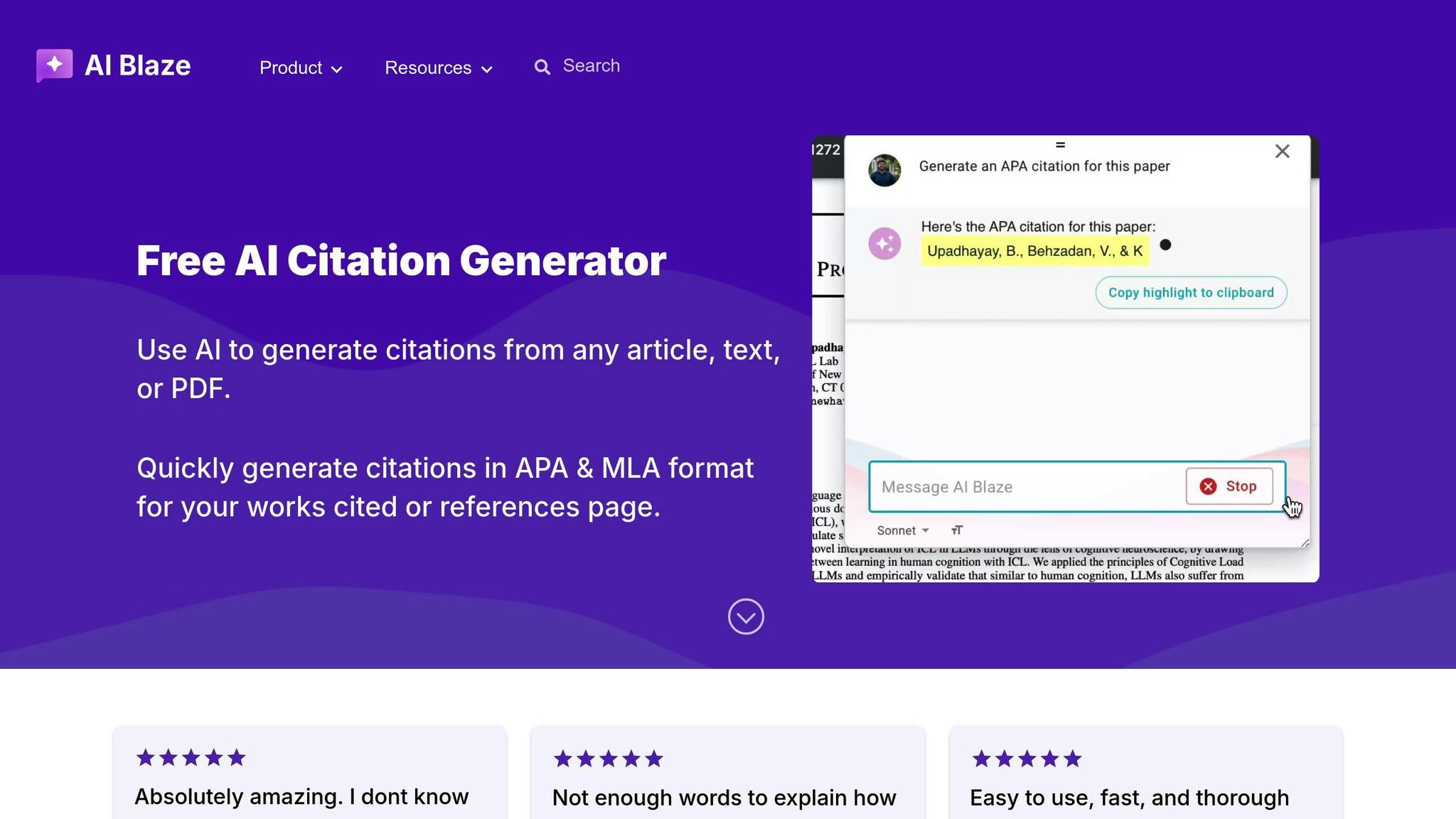
AI Blaze is a handy Chrome extension designed to simplify the citation process for researchers and students. Automating the creation of citations directly from online sources saves time and minimizes errors, making academic research more efficient.
With AI Blaze, you can generate citations in real-time using APA or MLA formats as you browse. Its seamless integration with Chrome ensures that your workflow isn’t interrupted.
Here’s what it offers:
- Automatic citation extraction from web pages
- Easy Chrome integration for smooth usage
- Support for APA and MLA formats
What sets AI Blaze apart is its ability to create citations instantly while you’re browsing, making it perfect for quick, online research. However, it’s important to double-check the citations, as the tool relies on the accuracy of the web sources it processes.
That said, AI Blaze does have limitations. It doesn’t support non-web sources or handle bulk citations, which makes it less suitable for projects involving diverse materials. Still, for managing citations from online sources, its focused approach gets the job done effectively.
For those who need a tool that can handle a wider range of sources or bulk citation tasks, the QuillBot Citation Generator might be a better fit.
3. Quillbot Citation Generator
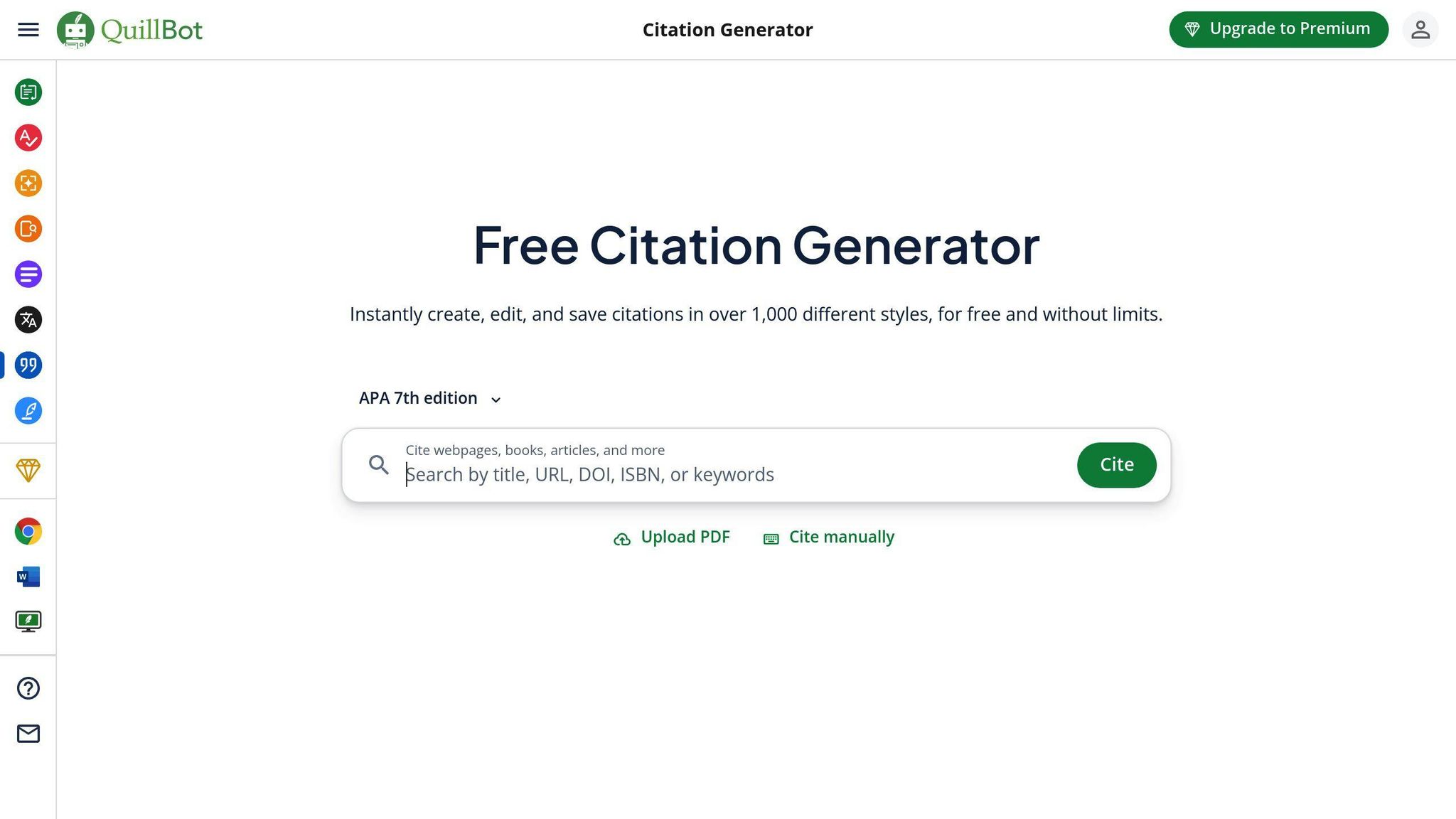
If you're looking for a tool that goes beyond basic online citations, the Quillbot Citation Generator is worth considering. It provides accurate citations in APA, MLA, and Chicago formats, making it a reliable choice for academic work.
One standout feature is its autocite function, which automatically analyzes and formats source details, saving you time and effort. Quillbot also integrates with popular writing platforms, ensuring your citations stay consistent across research papers, dissertations, and articles.
For those with a premium subscription, there are additional benefits:
| Feature | What It Does |
|---|---|
| Bulk Citation Creation | Allows you to create multiple citations at once |
| Advanced Style Support | Covers all major citation formats |
| Source Management | Helps you organize and manage references |
| Integration Tools | Seamlessly connects with writing platforms |
What sets Quillbot apart is its educational focus. While automating the citation process, it also explains citation rules, helping users learn proper academic referencing. This dual approach not only improves understanding but also minimizes time spent fixing errors, making it a practical tool for academic writing.
Additionally, Quillbot uses AI to check for completeness and formatting consistency, reducing the chance of citation mistakes that could impact academic integrity. For those working with detailed bibliographies, the premium features add extra functionality to an already capable tool.
4. Grammarly Citation Generator

The Grammarly Citation Generator is designed to work effortlessly within Grammarly's writing platform, combining citation creation with its well-known writing assistance tools. This setup lets users handle citations and improve their writing in one place, making the process smoother and faster. It supports MLA and APA citation formats, ensuring accuracy and proper formatting while minimizing mistakes.
Here’s what sets the Grammarly Citation Generator apart:
| Feature | What It Does |
|---|---|
| Real-time Integration | Works directly with Grammarly's writing assistant |
| Source Verification | Uses AI to check for accurate source details |
| Multi-format Support | Handles various types of sources |
| Writing Context | Links with proofreading tools for better writing flow |
Unlike standalone citation tools, Grammarly combines citation generation with its grammar-checking and proofreading features. This ensures both your citations and overall writing are consistent and polished. Its autocite feature simplifies the process by pulling citation details directly from URLs, DOIs, or ISBNs.
The free version provides basic citation tools, while the premium subscription unlocks advanced writing features that complement the citation process. Grammarly focuses on precision rather than offering a wide range of citation styles, making it especially useful for those already using its writing assistant.
This tool highlights how AI can simplify citation management while integrating it into a complete writing solution. By combining these tasks, Grammarly saves time and helps maintain academic integrity.
If you’re looking for a standalone citation tool, Citation Machine might be a better fit. However, Grammarly stands out for its all-in-one approach to writing and citation needs.
5. Citation Machine
Citation Machine, part of the Chegg network, provides an AI-driven tool for generating citations with ease. Its auto-fill feature pulls citation details directly from URLs, titles, or DOIs, making the process faster and simpler.
Here’s what it offers:
| Feature | Description | Benefit |
|---|---|---|
| Auto-fill Technology | Pulls citation data from URLs and titles | Saves time on manual entry |
| Multi-style Support | Updates citation formats to match academic standards | Ensures accurate formatting |
| Platform Integration | Compatible with Google Docs and Microsoft Word | Keeps your workflow smooth |
| Source Verification | AI checks for accuracy | Reduces citation mistakes |
Citation Machine ensures your citations align with the latest APA, MLA, and Chicago style updates. It’s available in both free and premium versions, with the premium tier offering extra tools for managing large bibliographies.
The tool stands out for its ability to handle multiple sources at once, making it a go-to for research-heavy projects like literature reviews or long papers. Its integration with popular writing platforms means you can add citations directly while drafting your document, keeping everything consistent.
Another key strength is its ability to handle a wide range of source types, including books, journal articles, websites, and datasets. This flexibility, paired with its bulk citation processing, makes it a solid choice for tackling large academic projects.
While Citation Machine is excellent for comprehensive citation management, MyBib focuses more on creating simple, student-friendly bibliographies.
6. MyBib
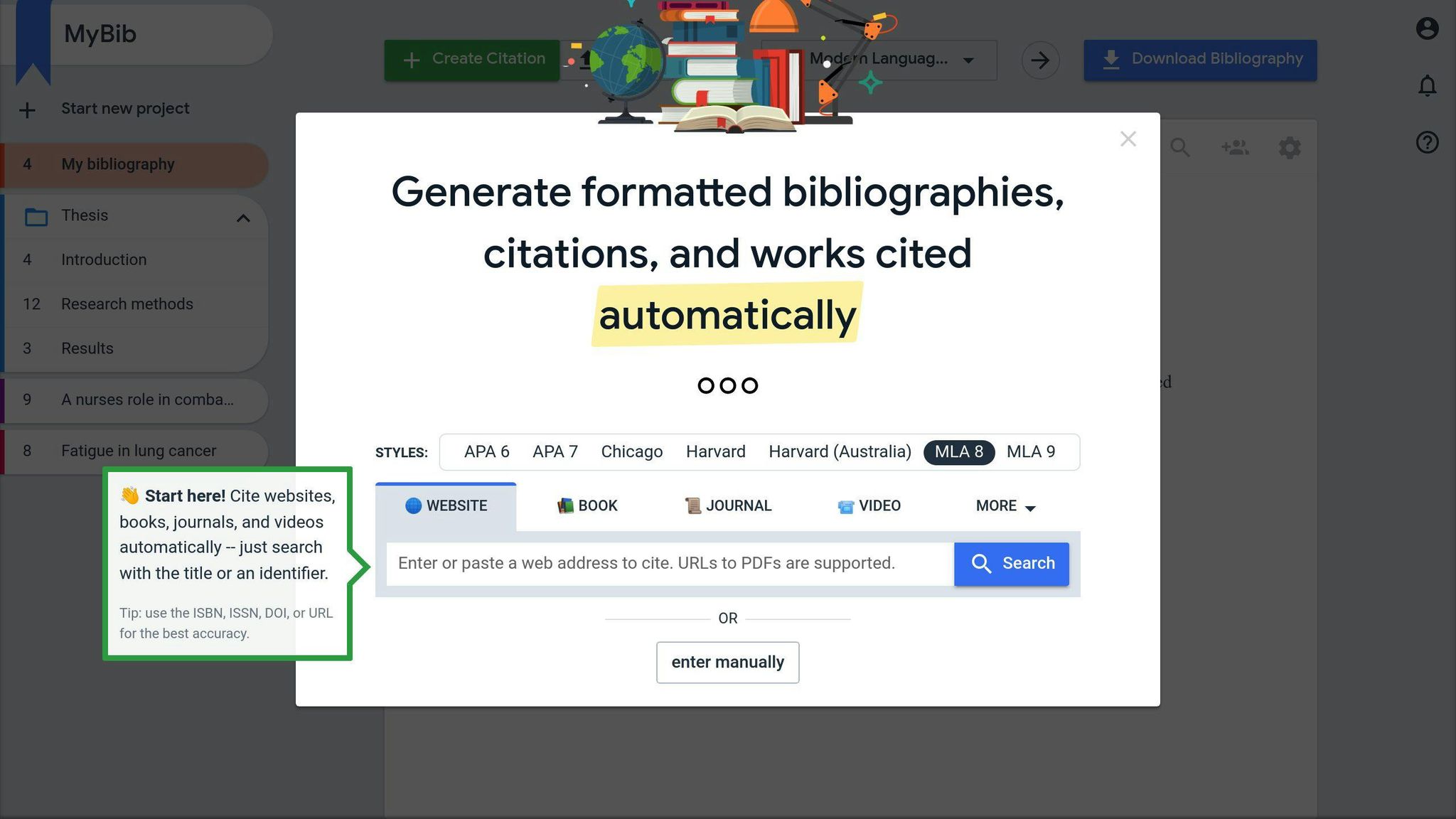
MyBib is an AI-driven citation tool that supports over 9,000 citation styles, making it a go-to option for academic writing needs. Unlike tools like Grammarly or Citation Machine, MyBib stands out for its extensive style library and straightforward design.
| Feature | Capability | User Benefit |
|---|---|---|
| Citation Style Support | Over 9,000 formats | Works for nearly any academic style |
| Source Coverage | Books, articles, websites, datasets | Covers a wide range of references |
| Integration | Compatible with writing platforms | Smooth workflow integration |
| AI Analysis | Verifies source details | Ensures higher citation accuracy |
MyBib's AI ensures citations are accurate and error-free. It works seamlessly with popular writing tools, offering broader style and source coverage compared to many other citation platforms. The tool also provides step-by-step guidance for creating citations and managing bibliographies.
The autocite feature is especially useful for creating multiple citations quickly. While similar to tools like Sourcely, MyBib offers broader support for different citation styles. This makes it easier to handle large reference lists while maintaining consistency and precision.
However, MyBib may not always handle rare or foreign sources perfectly, so it's a good idea to double-check such citations. Even so, its extensive style and source coverage meet the needs of most academic institutions.
If you're looking for advanced AI-powered insights, SciSpace Citation Generator might be worth exploring.
sbb-itb-f7d34da
7. SciSpace Citation Generator
SciSpace Citation Generator is designed to simplify academic writing with its smart source analysis and ability to handle multiple citations at once, ensuring both accuracy and efficiency.
| Feature | Capability | Advantage |
|---|---|---|
| Citation Styles | APA, MLA, Chicago | Supports widely-used formats |
| Source Types | Books, articles, websites, datasets | Handles a variety of references |
| AI Analysis | Automated error detection | Minimizes the need for manual checks |
| Bulk Processing | Processes multiple citations at once | Speeds up work on large bibliographies |
The tool uses AI to ensure citations are formatted correctly and helps catch errors across different styles. It integrates seamlessly with writing tools, making it a great choice for managing citations in extensive projects. The bulk citation feature is especially useful for compiling large bibliographies quickly.
SciSpace stands out for two main reasons:
- Advanced error detection and correction to uphold academic standards.
- Helpful guidance for formatting less common source types.
This makes it a go-to option for graduate students and researchers who need to ensure their citations meet academic requirements.
If you're looking for even more advanced citation tools, Trinka AI offers additional features specifically designed for academic precision and verification.
8. Scribbr Citation Tool
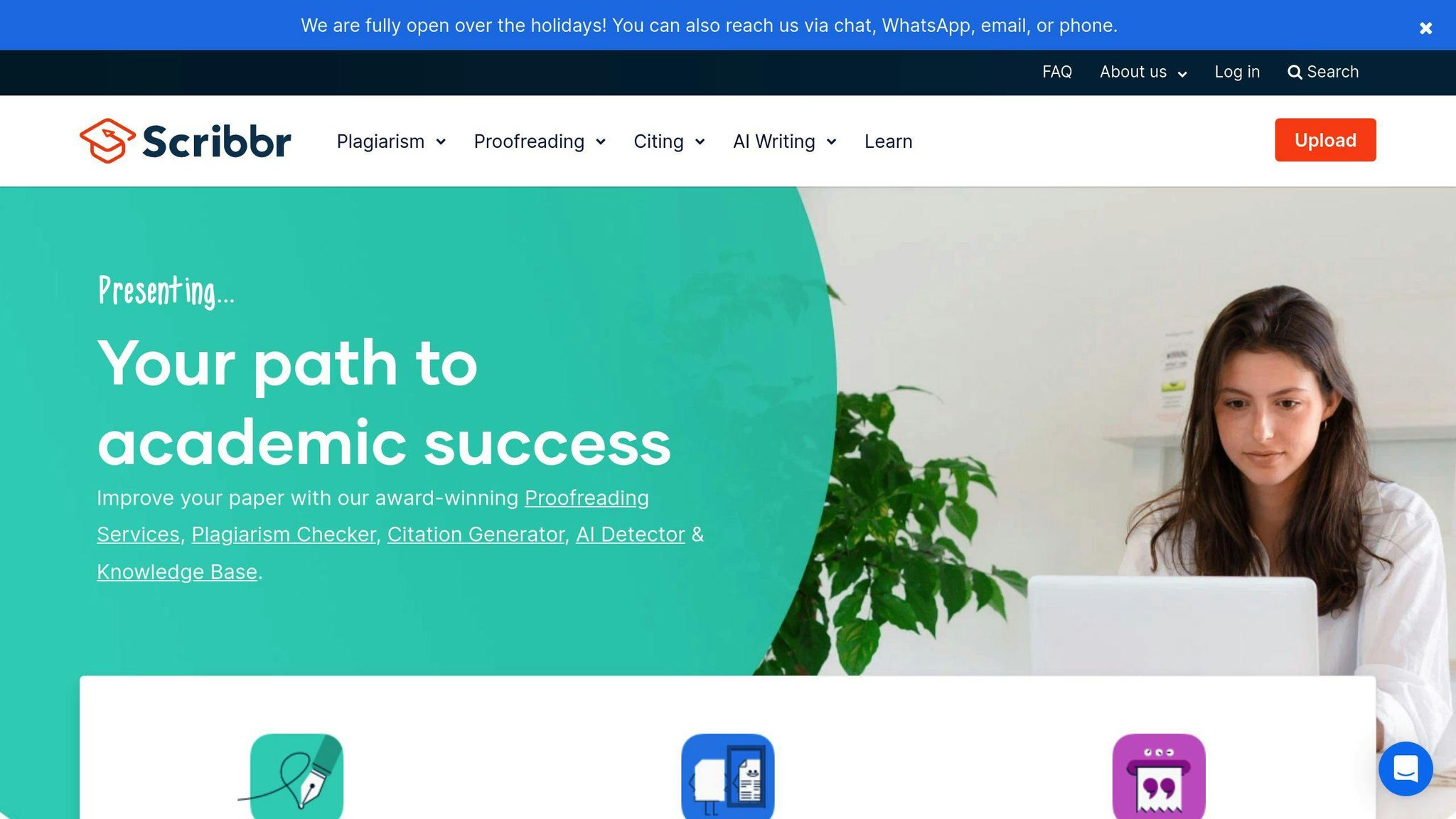
Scribbr blends automation with a strong emphasis on ethical research practices, making it a standout choice for academic citation management. The tool uses up-to-date citation templates that align with current academic guidelines.
| Feature | Description | Advantage |
|---|---|---|
| Auto-fill Technology | Pulls source details from URL/DOI/ISBN | Saves time and reduces errors |
| Citation Styles | APA, MLA, Chicago | Ensures proper formatting |
| Source Coverage | Books, articles, websites | Covers a broad range of sources |
| Template Updates | Regular updates to style guides | Keeps citations accurate |
Scribbr’s auto-fill feature simplifies the citation process by pulling bibliographic details directly from sources like URLs, DOIs, or ISBNs. This reduces the need for manual entry and helps minimize errors. Beyond just generating citations, Scribbr provides explanations of citation rules, making it a helpful learning tool for students.
With support for multiple citation styles, a wide range of source types, and regularly updated templates, Scribbr ensures accuracy and compliance with academic standards. It’s designed to assist both beginners and seasoned researchers by offering clear guidance on proper source attribution . By promoting ethical research practices, Scribbr helps maintain academic integrity while meeting professional expectations.
Though Scribbr focuses on user-friendly citation tools and educational support, Trinka AI takes things further by offering advanced features for academic precision.
9. Trinka AI
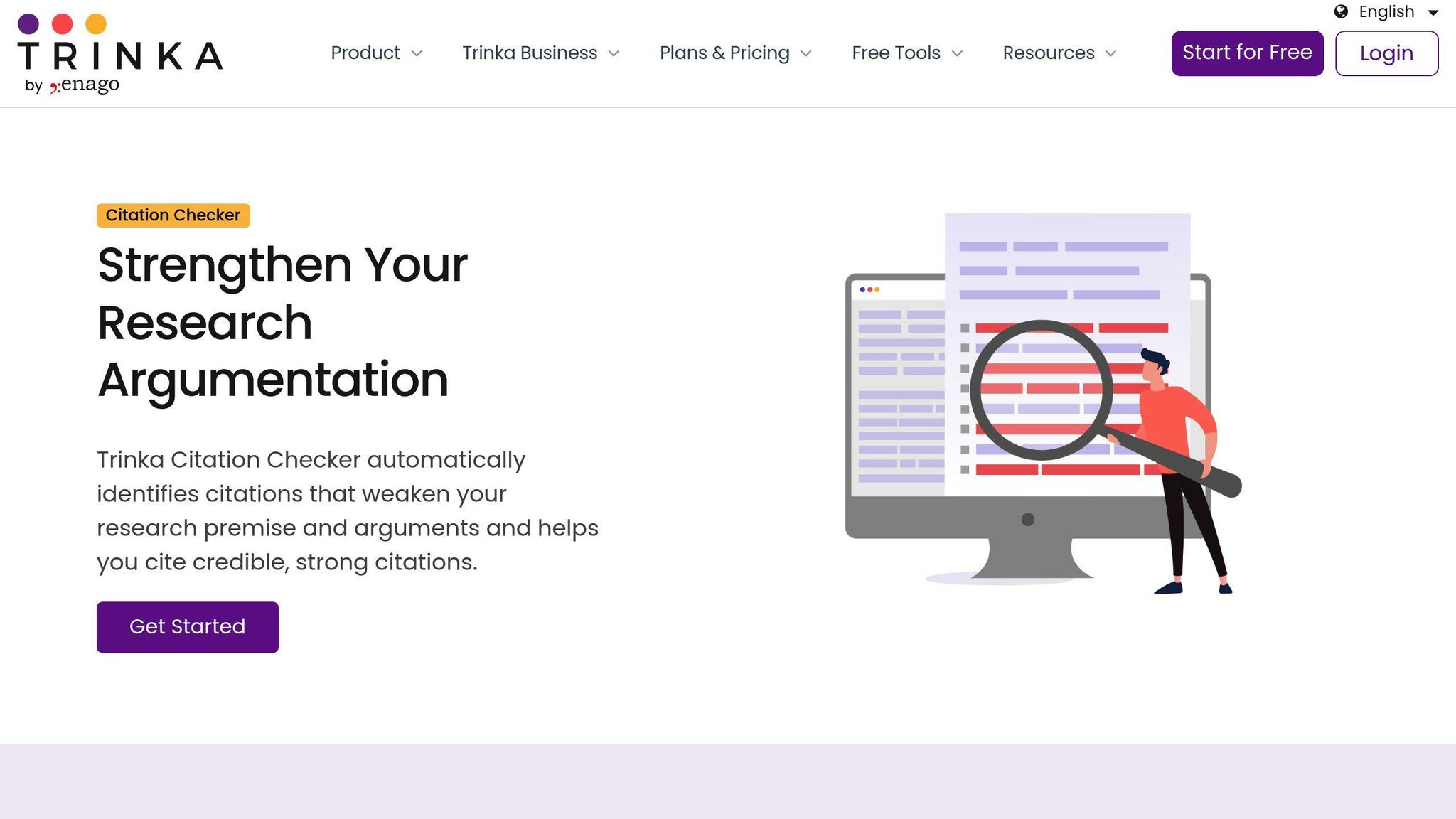
Trinka AI goes beyond simple citation management to offer a full suite of tools for academic writing. Its algorithms ensure precise citations while integrating smoothly with various writing platforms.
| Feature | Capability | Benefit |
|---|---|---|
| Citation Styles | APA, MLA, Chicago | Automatically detects and formats styles |
| Source Coverage | Books, articles, websites | Supports diverse research sources |
| Bulk Citation | Handles multiple citations | Saves time for extensive bibliographies |
| Writing Assistant | Built-in tools | Enhances clarity and readability |
Trinka AI combines citation tools with a writing assistant, improving both citation precision and writing quality in a single platform. Features like bulk citation and error detection simplify handling large bibliographies while meeting academic requirements.
One standout feature is its ability to identify and flag citation inconsistencies automatically, ensuring high academic standards. Additionally, Trinka AI offers a searchable database for quick access to relevant sources, making research faster and more efficient.
The tool integrates directly with writing platforms, allowing users to generate citations within their documents. Its blend of style detection and writing assistance ensures proper formatting and improves overall writing quality. This integration eliminates the hassle of switching between tools, streamlining both research and writing workflows.
While Trinka AI focuses on citation accuracy and writing improvements, Scite AI takes a different route by emphasizing citation impact analysis and reference verification.
10. Scite AI
Scite AI builds on tools like Trinka AI and Grammarly by introducing features that focus on smarter and more accurate citation management. Its Smart Citations and Citation Validation bring a new level of precision to academic writing by offering context and verifying the reliability of sources.
| Feature | Capability | Purpose |
|---|---|---|
| Smart Citations | Context-aware citations | Highlights how cited works are referenced |
| Literature Discovery | AI-powered search | Finds papers tailored to research topics |
| Citation Validation | Accuracy checking | Ensures citations support research claims |
| Style Support | Multiple formats | Supports APA, MLA, and Chicago styles |
Smart Citations help users see how cited works are referenced in other research, adding valuable context. Citation Validation checks whether sources truly back up claims, ensuring academic credibility. The Literature Discovery feature simplifies finding relevant papers, saving time and effort.
Scite AI not only provides tools for citation accuracy but also supports various writing styles like APA, MLA, and Chicago. It even includes autocite functionality for quick and easy bibliography creation.
What sets Scite AI apart is its usefulness across both academic and professional writing. Researchers, students, and professionals can all benefit from its focus on citation accuracy and smart context analysis. These features mark a major step forward in citation management tools.
Feature Comparison Table
Here's a breakdown of the main features offered by leading AI citation tools to help you decide which one suits your workflow best.
| Feature | Sourcely | AI Blaze | QuillBot | Grammarly | Citation Machine | MyBib | SciSpace | Scribbr | Trinka AI | Scite AI |
|---|---|---|---|---|---|---|---|---|---|---|
| Citation Accuracy | High | High | Very High | High | Good | Good | Excellent | Very High | High | Excellent |
| Writing Platform Integration | ✓ | Limited | ✓ | Full | ✓ | Excellent | Good | Good | Full | ✓ |
| Citation Styles Support | 7,000+ | APA, MLA | 8,000+ | Major Styles | 9,000+ | 9,000+ | 2,500+ | Major Styles | Multiple | Multiple |
| Bulk Citation | ✓ | ✓ | ✓ | ✗ | ✓ | ✓ | ✓ | ✓ | Limited | ✗ |
| Autocite | ✓ | ✓ | ✓ | ✓ | ✓ | ✓ | ✓ | ✓ | ✓ | ✓ |
| Smart Context Analysis | Limited | ✗ | ✓ | ✓ | ✗ | ✗ | ✓ | ✓ | ✓ | ✓ |
| Literature Discovery | ✓ | Limited | Limited | ✗ | ✓ | ✗ | ✓ | ✓ | ✓ | ✓ |
| Free Version | ✓ | ✓ | ✓ | Limited | Limited | ✓ | ✓ | Limited | Limited | Limited |
Key Takeaways:
- Accuracy Leaders: SciSpace and Scribbr are top choices for handling complex sources effectively.
- Style Variety: MyBib and Citation Machine support a wide range of citation styles, while SciSpace offers a blend of precision and support for 2,500+ styles.
- Convenience Features: Bulk citation and autocite are widely available, with Scribbr and AI Blaze being standout options.
- Unique Insights: Scite AI’s Smart Citations provide detailed contextual information about references, setting it apart from others.
These tools are continually updated to stay aligned with evolving academic standards, ensuring you have reliable options for your citation needs. Use this comparison to pinpoint the best tool for your projects.
Conclusion
After examining the features of various citation management tools, here are some key points to help you decide which one fits your needs. These tools simplify citation management and improve how researchers handle academic writing.
When choosing the right tool for your workflow, keep these factors in mind:
- Accuracy and Integration: Tools like SciSpace and Scribbr offer precise citation handling paired with intuitive interfaces, making them great for managing complex sources. Grammarly and Trinka AI stand out for their smooth integration into existing workflows.
- Advanced Features: Scite AI and SciSpace provide tools like context analysis and literature discovery, which add depth to your research.
- Cost and Accessibility: Sourcely and MyBib are excellent options for students and early-career researchers, thanks to their strong free plans.
These tools are built to adapt to researchers' changing needs. With AI capabilities, they can even manage newer content types, including AI-generated material, while maintaining academic integrity. By resolving common issues like manual errors and formatting problems, they help ensure accuracy and save time.
For large-scale research projects, SciSpace and Scribbr offer extensive support. Meanwhile, Scite AI's Smart Citations provide valuable insights by adding context to your references.
FAQs
Here are answers to some common questions about AI citation tools to help you use them effectively.
Is QuillBot Citation Generator free?
Yes, QuillBot's Citation Generator is completely free and supports APA, MLA, and Chicago citation formats.
What key features should I look for in an AI citation tool?
Choose tools that offer multiple citation styles (like APA and MLA), work seamlessly with writing platforms, ensure accuracy, and are easy to navigate. These tools can simplify citation management, saving you time and reducing mistakes .
How do AI citation tools handle different citation styles?
Most tools automatically format citations to meet academic standards. They ensure accuracy while offering instant formatting for various citation styles.
Can AI citation tools help prevent plagiarism?
Yes, many tools include plagiarism detection features alongside citation tools, ensuring proper credit is given and avoiding citation-related issues.
Are there AI citation tools for managing large research projects?
Definitely. Tools like SciSpace and Scribbr are designed for large-scale projects. They support bulk citation creation, manage references efficiently, and even allow collaboration, making them a great fit for researchers and academics .